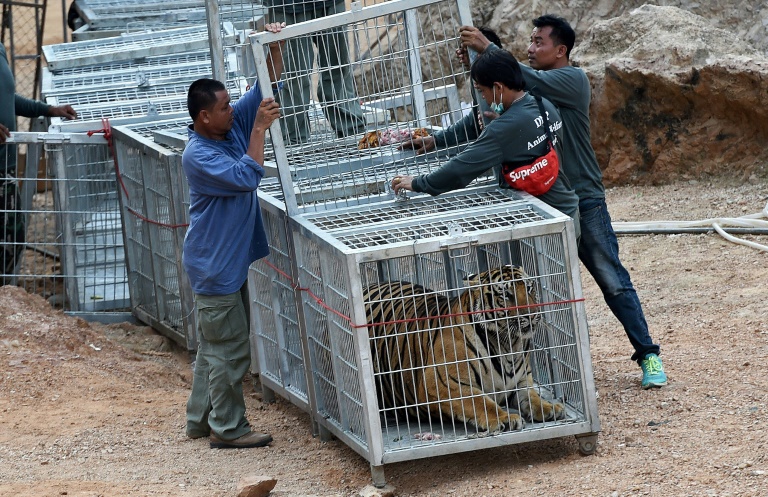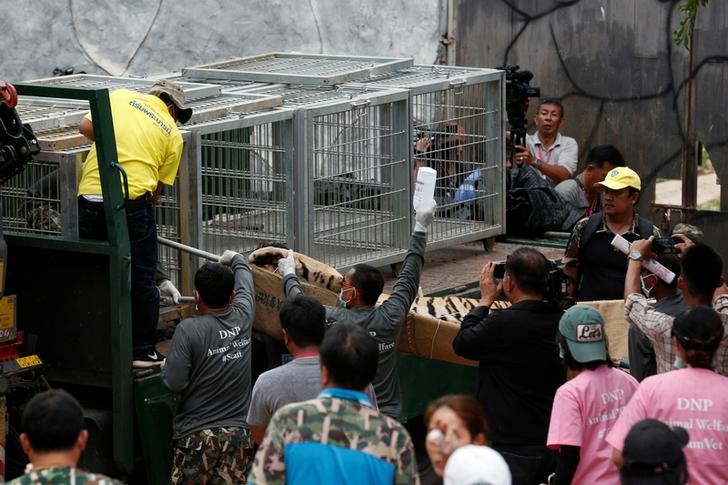Big cats removed from Thailand's infamous Tiger Temple
 |
| A sedated tiger is stretchered as officials start moving tigers from Thailand's controversial Tiger Temple in Kanchanaburi province. (Photo source: Reuters) |
KANCHANABURI, Thailand: Wildlife authorities in Thailand on Monday raided a Buddhist temple where tigers are kept, taking away three of the animals and vowing to confiscate scores more in response to global pressure over wildlife trafficking.
The Buddhist temple in Kanchanaburi province west of Bangkok has more than 100 tigers and has become a tourist destination where visitors take selfies with tigers and bottle-feed their cubs.
The temple promotes itself as a wildlife sanctuary, but in recent years it has been investigated for suspected links to wildlife trafficking and animal abuse.
Wildlife activists have accused the temple's monks of illegally breeding tigers, while some visitors have said the animals can appear drugged. The temple denies the accusations.
 |
| Wildlife officials use a tunnel of cages to capture a tiger and remove it from an enclosure in a temple in western Thailand on May 30, 2016 (AFP/Christophe Archambault) |
Animals rights groups also accuse the temple of complicity in the black-market animal trade, making tens of thousands of dollars by selling off older cats for use in Chinese medicine in a hugely lucrative trade. The temple has also always denied those allegations.
However last year one of the temple vets turned whistleblower, handing the authorities three microchips he said were inside a trio of tigers who had disappeared. It has never been fully established what happened to those tigers.
TUG-OF-WAR SINCE 2001
Monday's raid was the latest move by authorities in a tug-of-war since 2001 to bring the tigers under state control.
 |
| A sedated tiger is seen in a cage as officials start moving tigers from Thailand's controversial Tiger Temple in Kanchanaburi province. (photo source Reuters) |
It was also hampered by the monks who run the temple.
"The temple allowed tourists to come in...and they are feeding tigers while performing shows, which means the veterinarians cannot put them to sleep before relocation," an officer from the National Park, Wildlife and Plant Conservation told AFP, requesting anonymity.
Adisorn Nuchdamrong, deputy director-general of the Department of National Parks, said the team had been able to confiscate the tigers thanks to a warrant obtained a few hours before the operation.
"We have a court warrant this time, unlike previous times, when we only asked for the temple's cooperation, which did not work," Adisorn told Reuters. "International pressure concerning illegal wildlife trafficking is also part of why we're acting now."
 |
| A sedated tiger is stretchered as officials start moving tigers from Thailand's controversial Tiger Temple in Kanchanaburi province. (Photo source Reuters) |
Officials from the Department of National Parks, Wildlife and Plant Conservation said they planned to confiscate and remove more tigers from the temple on Tuesday and send them to a state-owned sanctuary.
Previous attempts to inspect the tigers have largely been blocked by the temple's abbots but in January and February wildlife officials removed 10 of the tigers.
Thailand has long been a hub for the illicit trafficking of wildlife and forest products, including ivory. Exotic birds, mammals and reptiles, some of them endangered species, can often be found on sale in markets.
 |
| Officials prepare weapons with a sedation as they start moving tigers from Thailand's controversial Tiger Temple in Kanchanaburi province. (Photo source Reuters) |
The government introduced new animal welfare laws in 2015 aimed at curbing animal abuse, but activists accuse authorities of not enforcing the legislation properly.
(Additional reporting by Juarawee Kittisilpa; Writing by Amy Sawitta Lefevre; Editing by Robert Birsel)
What the stars mean:
★ Poor ★ ★ Promising ★★★ Good ★★★★ Very good ★★★★★ Exceptional
Latest News
More News
- Russian President congratulates Vietnamese Party leader during phone talks (January 25, 2026 | 09:58)
- Worldwide congratulations underscore confidence in Vietnam’s 14th Party Congress (January 23, 2026 | 09:02)
- Political parties, organisations, int’l friends send congratulations to 14th National Party Congress (January 22, 2026 | 09:33)
- 14th National Party Congress: Japanese media highlight Vietnam’s growth targets (January 21, 2026 | 09:46)
- 14th National Party Congress: Driving force for Vietnam to continue renewal, innovation, breakthroughs (January 21, 2026 | 09:42)
- Vietnam remains spiritual support for progressive forces: Colombian party leader (January 21, 2026 | 08:00)
- Int'l media provides large coverage of 14th National Party Congress's first working day (January 20, 2026 | 09:09)
- Vietnamese firms win top honours at ASEAN Digital Awards (January 16, 2026 | 16:45)
- ASEAN Digital Ministers' Meeting opens in Hanoi (January 15, 2026 | 15:33)
- ASEAN economies move up the global chip value chain (December 09, 2025 | 13:32)
















 Mobile Version
Mobile Version